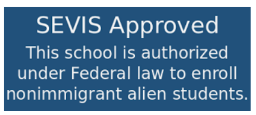Student Visa Information
Visa Definitions
The U.S.A. may issue different types of visas to students.
* A full-time student would receive an F-1 visa.
* Your spouse and children may receive F-2 visas.
How To Apply
As stated above, to study English in the United States, you will need a F -1 Student Visa. To apply for a student visa you need to present an I -20 form. USAELC is authorized by Federal Law to issue I-20 Student Visa Form. This process takes approximately 10 days. If you need to have issued an I-20 form, please apply as early as possible. On USAELC accepts a potential student, an I-20 and a letter of acceptance is sent to the student. The student must take their passport, I-20 and financial documentation to apply for an F-1 student visa to the US embassy or Consulate in their country. After obtaining the visa, you can enter the US with your passport, I-20, and financial documentation.
Please contact USA English Language Center if you are interested in doing a change of status to request a student visa.
Succeeding in your Visa Interview
Students are often confused about the U.S. visa application process. In fact, most applicants (70 percent) successfully obtain a student visa and can continue on to a wonderful experience studying in the United States. However, the rejection rate for visa applications is higher in some countries, and appropriate preparation will always be helpful.
The Basics
To apply for a student visa, you will have to provide the U.S. Embassy or consulate in your country with certain required documents. You must be able to convince the consular affairs officer that you have sufficient financial support to pay for your studies and that you will return home upon the completion of your studies in the United States. You will need a form showing acceptance to an institution authorized by the U. S. Citizenship and Naturalization Service (USA English Language Center) to enroll non-immigrant students (currently the I-20 for an F-1 visa, which you read and sign prior to beginning the visa application process.) You pay a $100 visa application fee and produce proof of that payment before submitting the visa application. An additional fee for student and most exchange visitor visa applicants is now required., The new fee is $100 and must be paid before you can apply for a student visa. This fee is to cover the cost of the computer system (SEVIS) utilized by the Department of Homeland Security and is in addition to the $100 visa application fee. Payment of the new SEVIS fee is made separately from the actual visa application fee. Payment can be made via the internet with a credit card (highly recommended), or at Western Union offices in most countries using local currency or by mail. If you register on the internet be sure to print a receipt! Details on payment procedures are available at ICE Student/Exchange Visitor web site or on the web site of the US Embassy in your country. Remember to use the exact same order and spelling of your names as they are found in your passport.

Applying for your Visa
Be well-prepared for your first visa interview. This is your best chance. It is much more difficult to obtain a visa if you have been denied one before. What you wear is important. Consider the interview a formal event. Business attire is appropriate. First impressions can be crucial, since there will be little time to speak with the officer, who will often have only a few minutes to conduct the interview and make a decision. Be prepared to give your information quickly and completely. If you are unable to answer the questions in English, and the visa officer does not speak your language, you can ask for an interpreter. Speaking English is not a requirement for a student visa. In fact thousands of students come to the United States each year to learn how to speak English. The visa officer needs to know your specific objective for studying in the United States. Visa officers generally react poorly to applicants who give vague answers, memorize a speech, or make overly solicitous comments about how great and wonderful the United States is. Visa officers like to hear honest, specific responses to questions.
The Objective
You should have a specific academic or professional objective. Be prepared to explain why it is better to study a specific field in the United States than to study at home. Be ready to say exactly what you will study and for what kind of career in your home country you are preparing. If you are going to the U.S.A. to study English and then earn a degree, be able to explain your complete program of study. Remember, it is not enough to just say It is better to study in the United States. If you will return home to complete university studies after studying English in the United States, bring proof of your student status in your country. A letter from a university professor supporting your study plan can be helpful. Unfortunately, there are a few consular posts that make it difficult or impossible for a qualified applicant to obtain a visa if your application is based on acceptance from a U.S. intensive English program. Studying English is a perfectly legitimate reason for studying in the United States. Young people around the world are often unsure of their plans. However, in the visa interview it is best to give definite answers. If you seem to be unsure about what you will be doing, the visa officer may be less likely to believe that you are really going to the United States only to study. In addition to a specific study plan, have some information about the program you plan to attend and where you will live. Grades do make a difference. If your grades are below average, be ready to explain how you are going to succeed in the United States. A letter from a school director or teacher or from the U.S. admitting school stating that the proposed program of study in the United States makes sense and can be helpful. If there were special circumstances (such as a death or illness in the immediate family ) that contributed to the bad grades, have the school explain those special circumstances. If possible, ask someone at your USA English Language Center to write a letter explaining that they believe that you will succeed in their school.
Financial Support
You must have adequate, demonstrable financial support to live and study in the United States. Visa applications are generally stronger if the financial support comes from family, employers, or other institutional sponsors located in the home country. If your parents will pay for your education, be ready to document how your family gets its income. Bring a letter from your parents employer stating what the parents job is, how long they have worked at that organization, and how much they earn. When visa officers see what they believe does not make sense, they reject visas. If your family can only show enough income to support you in the United States, the officer will wonder how the family will survive at home. Large sums of money in bank accounts may not be sufficient proof of financial support. When providing information about bank accounts, obtain a letter from your bank that states how long the account has existed, and what the average balance in the account has been.
Other Suggestions
It is more important than ever to apply for your visa well in advance of the date you will begin your studies. Try to apply at least three months before you plan to travel. This will give you extra time if there are delays at the embassy, or if you wish to appeal a decision in the event of a denial. All applicants names have to be submitted for a security clearance. Citizens of some countries have to undergo additional screening that takes several additional weeks of processing.
Visa issuance procedures and policies vary at U.S. Embassies around the world.
Visit the nearest U.S. Department of State-affiliated advising center office, located throughout the world and listed on the U.S. Department of State web site. The staff at these centers will be knowledgeable of local conditions and procedures. A fee to cover the cost of the U.S. student tracking system is required of all F,M, and most J Visa applicants, before you apply for a visa.
If All Else Fails
If you are denied a visa, there is recourse. You may appeal the decision. In most cases, you will need to provide additional documentation that was not presented with the initial application. If the visa denial form indicates Section 214.b of the Immigration Act as the reason for denial, then you have failed to convince the visa officer that you will return home upon completion of your studies. A fax or e-mail from your U.S. program to the embassy or consulate containing details about your qualifications, and requesting reconsideration, can be helpful in pursuing a successful appeal. Faxes should be addressed to the Chief of Nonimmigrant Visas at the Consular post in question. Fax and telephone numbers are available on the US Department of State web site. In some cases, a visa officer may request additional information. You should respond with the information requested.
After USA English Language Center has accepted you for admission to full-time study, the school will send you a document called an I-20 form, which is the application for an F-1 visa.
Five Tips for Getting your Visa
* Wear a business suit or dress
* Be specific when you answer questions
* Bring bank statements or proof of employment
* Provide details of your study plans
* Tell the truth

